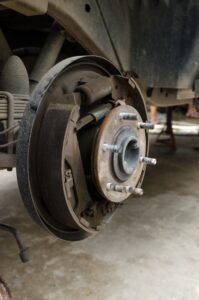This Is the First in a Series of Blog Posts on Automobile Brakes
Since the late 1800s, people have building and improving cars. This includes the different types of brakes for these invaluable machines. Originally, cars only had one type of brake its could use: drum brakes. These became the primary braking system for cars until the introduction of disc brakes in the 1950s. While cars were transitioned to using disc brakes, drum brakes are still used in modern cars. But what is the difference between these two types of brakes?
 Since the invention of the car, drum brakes have been a primary braking system. Drum brakes are made up of brake shoes, drums, and wheel cylinders. Each drum brake has a corresponding brake shoe that presses against the drive depresses the brake. Despite advancements of disc brakes, drum brakes are still used in modern cars. You might be wondering why modern cars and trucks would be using them in this century. While drum brakes are only used on the rear wheels, there are some advantages for manufacturers to use them over disk brakes. First of all, drum brakes have fewer components than disc brakes. This makes it easier and cheaper to manufacture. However, manufacturing cost is just a small part of why drum brakes are still essential.
Since the invention of the car, drum brakes have been a primary braking system. Drum brakes are made up of brake shoes, drums, and wheel cylinders. Each drum brake has a corresponding brake shoe that presses against the drive depresses the brake. Despite advancements of disc brakes, drum brakes are still used in modern cars. You might be wondering why modern cars and trucks would be using them in this century. While drum brakes are only used on the rear wheels, there are some advantages for manufacturers to use them over disk brakes. First of all, drum brakes have fewer components than disc brakes. This makes it easier and cheaper to manufacture. However, manufacturing cost is just a small part of why drum brakes are still essential.
Rear drum brakes generate less heat than disk brakes, making them last longer. Furthermore, it has more friction contact points, giving them more braking power. They also require less maintenance compared to disk brakes due to its corrosion resistance. For these reasons, drum brakes still had a prominent place even after the invention of the disc brake.
While disc brakes were invented around the same time as drum brakes, they did not find practical use till around 1950s. As cars became more powerful, drum brakes had a hard time keeping up. As a result, disc brakes’ superior performance made it quickly become the replacement for much of the drum brake use. Today, most cars have disc brakes installed. However, what features of these brakes made them become standardized in modern cars?
Disc brakes are comprised of calipers, brake rotors, and brake pads. When the driver applies pressure to the brake pedal, the brake pads push against the brake rotor. This system provides better braking power. Disc brakes have a better response time than drum brakes, leading to a fast stop time. They are less likely to warp due to their shorter cooldown time. Disc brakes also handle wet conditions better than drum brakes. This is because liquid does not build up on the disc, unlike it does on a drum brake.
Since both drum and disc brakes are used in vintage and modern vehicles, auto shops need to know about both types of brakes. Mr. Muffler mechanics have extensive knowledge of both older and new cars using drum and/or disc brakes. This is why Mr. Muffler is doing an entire series about brakes. This article covering the history and types of brakes will be followed by brake repairs or replacement and cost comparisons! Join us in our next segment coming soon!